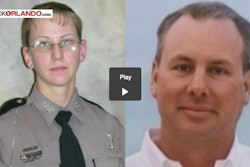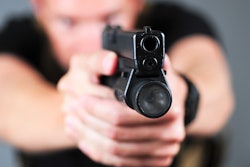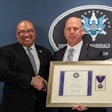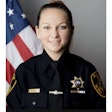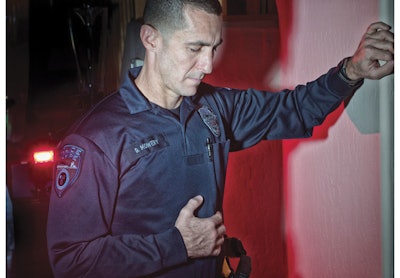 Photo: Mark W. Clark
Photo: Mark W. Clark
Two months ago Officer Marc Uland Kelley of the Trinity University Police Department responded to a fire alarm in one of the San Antonio school's residence halls. He died later that week in a hospital.
Kelley wasn't shot. He wasn't stabbed. And there was no fire so he didn't suffer burns or smoke inhalation. At 41, he died of a heart attack.
The question medical researchers and officer fitness experts are asking is if Kelley's choice of profession played a role in his premature death. So far the answer is maybe.
Hard Numbers
You don't have to look far to find anecdotal evidence that law enforcement officers seem to be prone to cardio-vascular disease (CVD). Last year alone 10 officers died on duty from heart attacks, accounting for roughly 15% of all non-felonious line-of-duty deaths. And that led to a number of media reports about the threat of CVD among law enforcement officers.
But just because 10 officers died last year from heart disease does not mean that cops are any more prone to CVD than any other group of Americans. Americans in general are not as heart healthy as they could be. Centers for Disease Control statistics show that 800,000 Americans died from CVD in 2010 and of that number more than 25% could have been prevented. Even more alarming is the fact that 56% of the preventable heart disease deaths in that year involved people too young to receive senior citizen discounts at the movie theater.
Heart disease is rampant in America and that makes it difficult to draw conclusions about the frequency of CVD among law enforcement officers. Still, some doctors think there could be a higher rate of heart attacks among both male and female officers than other Americans of the same age, but there is no definitive evidence that this is true.
This Job Kills
What is certainly true, however, is that the lifestyle of many working law enforcement officers amounts to a recipe for heart disease, whether the condition manifests while they are still on the job or long after they have retired. Smoking (exposure to second-hand smoke), poor diet, lack of exercise, too little sleep, lengthy hours of sitting, and stress are known factors in the development of heart disease and other chronic and potentially deadly health conditions. And many law enforcement officers are committing these sins against their bodies either voluntarily or as just part of the job.
Many new officers leave the academy so fit they can run for miles over hills and take on the world in hand-to-hand combat. Then the job and the life start to chip away at that fitness.
If cops in real life did what they do on TV shows and in movies—constantly running after criminals—then the job would be much more active. But as anyone who has worked in a patrol car knows, the job is much more sedentary than the public thinks. "Sitting for eight hours a day absolutely increases your risk of heart disease and diabetes," says Dr. Sarah Gamble, who volunteers as a physician for the Greenwich (Conn.) Police Department. "Unfortunately, officers on patrol don't have stand-up cars so it's an occupational hazard." Gamble recommends that officers visit www.juststand.org to learn more about the hazards of sitting and strategies for being less sedentary.
Sitting all day is bad for everyone, not just officers. And it's made worse when people don't exercise at all. But unlike it was in the Academy, exercise is not part of the daily duties of officers. Which means they have to make time for it, and that's difficult. The demands on the time of officers can be overwhelming. They often commute long distances to work in cities where they can't afford to live, then upon arrival they start a 10-hour shift, and after that they pick up department-sanctioned overtime providing security. That doesn't leave much time for sleep, much less exercise.
Lack of sleep is another major concern for law enforcement officers. Shift work murders sleep, according to many studies and according to the experiences of anyone who has had the displeasure of working the third watch. It's bad enough when officers are single and trying to sleep in the day when the rest of the world doesn't. It's even more difficult when you are married with kids. Which can really make home life stressful.
And cops don't need any more stress. In any list of most stressful occupations, police officer is usually near the top. The stress officers experience on the job is both readily apparent to them and insidious. An officer involved in a violent confrontation is obviously under a lot of stress. But so is an officer responding to some terrible accident or incident. And even an officer back at the station writing up reports is under stress, deadline stress, blank page stress.
People under stress react in a lot of heart harmful ways. Some smoke. (Roughly 16% of American officers still puff away.) Some hit the bars. Many others ingest too much caffeine through coffee, energy drinks, and carbonated sodas. Others eat when they aren't hungry. And what they eat is only loosely defined as "food."
For a variety of reasons, most police officers eat as badly as just about everyone else in this country. Tight schedules lead to officers picking up something at the fast food place or even the convenience store, wolfing it down and hitting the streets. Even in their private lives, many officers rarely have time for a proper and healthy meal.
The body's response to poor nutrition (too much fat, too much sugar, and too much sodium) can be devastating. "Weight gain from eating fat laden and salty foods leads to high cholesterol, high blood pressure, and obesity," Gamble explains. "Drinking sugary sodas and sugar-laden coffees combined with the inactivity of the job can cause diabetes. And a combination of high cholesterol, high blood pressure, obesity, inactivity, and diabetes makes any LEO a frontrunner for a heart attack, stroke, and even early death."
Make Some Changes
Medical experts say officers who are worried about heart attacks need to dump some bad habits that are quite literally killing them and start living healthier.
It's hard to believe but half a century after the 1964 Surgeon General's report on the hazards of smoking many American officers still smoke. If you are one of these smoking officers, you probably think cancer is your primary health concern. That may not be the case. "Many smokers develop heart disease long before they develop cancer," Gamble says.
Her advice to smokers is to find a way to quit. She recommends you follow the START plan. That acronym stands for: Set a quit date; Tell family or friends that you are quitting; Anticipate and plan for difficulty; Remove tobacco completely from your environment; and Talk to your doctor about meds that can help. "LEOs who are trying to quit should stay away from smokers and places they associate with smoking," Gamble says. "If people close to you smoke, ask them to quit too. Keep gum or candy handy for cravings. And don't give up, even if you start (smoking) again."
Even if you don't smoke, you may have other habits that are nearly as bad, especially when it comes to food. Many officers, like many Americans, eat badly for a variety of reasons such as a perceived lack of time, limited access to wholesome food while working, and irresistible cravings for the taste of fast food, which features just the right combination of fat, sugar, and, salt to set off pleasure chemicals in the brain. Gamble's solution to this problem is the brown bag. "Bring your own healthy food to work. Substitute healthy snacks like nuts, carrot sticks, fruit, and water for candy, chips, and soda. And if you forget your brown bag and your healthy snacks, remember that even the most sketchy of gas stations has a few pieces of fruit on the counter."
Agencies can also help their officers eat better, according to Gamble. "Departments can inexpensively establish an appealing kitchen area with a mini-fridge, microwave, and toaster oven to support the LEOs with the brown bag habit," she says.
Gamble also believes agencies should take steps to make it easier for officers to exercise before and after their shifts. She realizes budgets are tight and many departments can't afford to buy brand new gym equipment, but she says these agencies should consider the cost of officer disability. Also, she says agencies can seek alternative means of providing fitness center equipment for their officers. She recommends that departments look into acquiring fitness equipment from the Department of Defense Excess Property Program (1033 Program). Departments can also seek private contributions to fund fitness facilities.
Medical experts stress that one of the primary reasons why so many Americans are so unhealthy is that they don't take advantage of the medical care available to them and they don't think enough about their cardio-vascular health. They argue that Americans, with all of their advantages, should be among the healthiest people in the world. But instead we are literally killing ourselves with our stressful, sedentary lifestyles.
"The greatest advance in the understanding of heart disease was the discovery that it can be virtually eliminated by controlling three factors: cholesterol, smoking, and blood pressure. More effort needs to go into helping LEOs change long-standing smoking and poor dietary habits," Gamble says. "It's a tragedy if we lose anyone—much less a police officer—to a heart attack in this country."
Editor's Note:
Dr. Sarah Gamble can be reached at Office@PrecinctMedicine.com. She has offered to help officers and agencies contact local physicians who participate in the International Association of Chiefs of Police (IACP) Police Physicians program.
Related Story:






